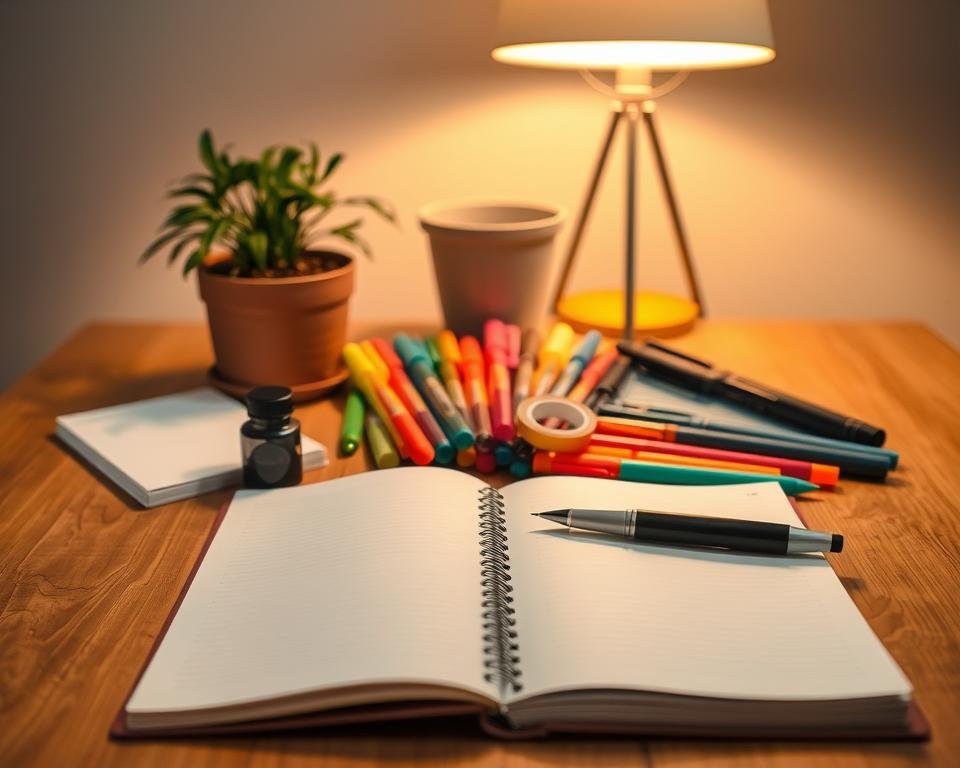I’ve learned a lot about journaling and I’m excited to share it with you. It’s a great way to find yourself, relax, and grow.
Adding journaling techniques to your day can really help your mind and heart. We’ll dive into the world of journaling and its many benefits.
Key Takeaways
- Discover the benefits of journaling for self-discovery and stress relief.
- Learn effective journaling techniques to enhance personal growth.
- Understand how to start your own journaling journey.
- Explore the impact of journaling on mental and emotional well-being.
- Find out how to make journaling a consistent part of your daily routine.
The Benefits of Journaling for Mental Health
Journaling is great for your mental health. It helps you write down your feelings. This can make you feel better.
It also helps lower stress and anxiety. Writing down your worries can help you understand them better. This makes you feel calmer and less overwhelmed.
Reducing Stress and Anxiety
Journaling is good at making you feel less stressed and anxious. It lets you write down your feelings. This can help you see things more clearly and feel calmer.
Free writing or morning pages are great for stress relief. They let you write freely without stopping. This helps you release your emotions and clear your mind.
Enhancing Self-Awareness
Journaling also helps you know yourself better. It lets you think about your experiences, values, and goals. This can help you grow and make better choices.
- Identify patterns in your thoughts and behaviors
- Explore your values and goals
- Develop a greater understanding of your emotional responses
Boosting Emotional Well-Being
Journaling can also make you feel happier. Focusing on the good things in your life can make you more optimistic. This can make you happier and more satisfied with life.
Keeping a gratitude journal can really help. Writing down things you’re thankful for can make you focus on the positive.
Different Types of Journals to Explore
Looking into various journals can help you find the right one for you. There are many options, so you can pick one that matches your interests and goals.
Gratitude Journals
A gratitude journal helps you stay positive. It focuses on the good things in your life. Just write down three to five things you’re thankful for each day.
Benefits of Gratitude Journaling:
- Improves mental well-being
- Enhances self-awareness
- Fosters a positive attitude
Bullet Journals
Bullet journals are organized and structured. They help you keep track of tasks and thoughts. You can customize it with an index and symbols.

Dream Journals
Dream journals explore your subconscious. Write down your dreams as soon as you wake up. This can reveal a lot about your thoughts and feelings.
Tips for Dream Journaling:
- Be consistent in recording your dreams
- Use vivid descriptions to capture the details
- Reflect on your dreams to identify recurring themes
Travel Journals
Travel journals are perfect for documenting your adventures. Include memories, ticket stubs, and postcards. It becomes a special keepsake.
Ideas for Travel Journaling:
- Write about the places you visit and the people you meet
- Include photos and other visual elements
- Record your thoughts and reflections on the experiences
Essential Tools and Supplies for Journaling
Starting your journaling journey means picking the right tools and supplies. It’s important to choose a journal, pens, and other writing tools that fit your style.
Choosing the Right Journal
Finding the perfect journal is your first step. Think about size, paper quality, and binding. A journal that’s too big or too small can be a problem.
Look for high-quality paper that works well with your writing tools. Whether you use a pen or pencil, the paper should handle it smoothly.
Key considerations include:
- Size: Pick a size that’s easy to carry and write with.
- Paper Quality: Choose paper that’s smooth and lasts long.
- Binding: A sewn binding is durable and lasts longer.
Best Pens and Writing Tools
The right pen makes journaling better. Look for pens that write smoothly and consistently. Gel pens, fountain pens, and rollerball pens are good choices.

Digital vs. Paper Journals
You can use digital or paper journals for journaling. Digital journals are convenient and secure. They sync across devices.
Paper journals offer a hands-on experience. They let you doodle and sketch freely.
Think about what you want from journaling to choose between digital and paper. Some people use both, depending on their needs.
To start journaling, try out different options. Whether you want to reduce stress, learn more about yourself, or just enjoy writing, the right tools are key.
How to Start a Journaling Habit
Starting a daily journaling habit takes commitment, but it’s worth it. Journaling helps you deal with your thoughts and feelings. It lets you understand yourself better.
Setting Realistic Goals
Setting realistic goals is key to journaling every day. Start with a small goal, like writing for five to ten minutes each day. You can write about your day, what you learned, or your feelings.
Begin by writing about your day. Reflect on what you’ve learned. Explore your feelings about certain events. As you get better, you can change your goals to fit your needs.
Creating a Dedicated Journaling Space
Having a special place for journaling can help you stick to it. Choose a quiet, comfy spot in your home or outside. Add things that spark your creativity, like plants or scents.

Tips for Consistency
To keep journaling a habit, be consistent. Set reminders or put journaling in your planner. Try different ways of journaling, like drawing or poetry, to make it fun.
| Tips | Benefits |
|---|---|
| Set a regular journaling schedule | Develops a consistent habit |
| Experiment with different journaling techniques | Keeps journaling interesting and engaging |
| Create a dedicated journaling space | Enhances the journaling experience |
By following these tips, you can make journaling a daily habit. It will improve your mental and emotional health. With time and effort, journaling will become a big part of your life, helping you face challenges with confidence.
Journaling Prompts to Spark Creativity
Journaling prompts are a great way to spark creativity and think deeply. They help unlock your imagination and explore your thoughts and feelings.
Journaling is a personal journey. The right prompts can make a big difference. Here are some categories to get you started:
Daily Reflections
Daily reflection prompts help you think about your day. They include:
- What did I learn today?
- What am I grateful for?
- What challenges did I face, and how did I overcome them?
Explore Personal Memories
Journaling about personal memories can be healing. It helps you understand your past and how it affects you now. Try prompts like:
- What’s my favorite childhood memory, and why is it significant?
- Describe a challenging experience from your past and what you learned from it.
Goal-Setting Prompts
Goal-setting prompts help you set clear goals and plan how to achieve them. Use prompts such as:
- What are my short-term goals, and what steps can I take to achieve them?
- Where do I see myself in five years, and what actions can I take now to move closer to that vision?
To get the most from these prompts, journal every day. Being consistent is key to a meaningful journaling habit.
| Prompt Type | Date | Reflection |
|---|---|---|
| Daily Reflection | 2023-04-01 | I learned about patience today. |
| Personal Memory | 2023-04-05 | Recalled a happy memory from childhood. |
| Goal Setting | 2023-04-10 | Set a goal to read more books. |
By using these prompts daily, you can boost your creativity. You’ll also reflect on your experiences and work towards your goals.
Overcoming Common Journaling Challenges
Starting a new habit, like journaling, can face challenges. These obstacles can slow down your progress. We’ll look at common issues and offer tips to beat them.
Dealing with Writer’s Block
Writer’s block is a big problem for many writers. It’s tough to start when your page is blank. Try changing where you write to spark new ideas.
Using prompts can also help. Look online for journaling ideas or make your own. Freewriting, where you write freely, can also get you started.

Making Time for Journaling
Finding time for journaling is a big challenge. Busy lives make it hard to fit it in. But, it’s key to make journaling a daily habit, even if it’s just a few minutes.
Make journaling part of your daily routine. Try journaling in the morning, at night, or during your lunch. Find a time that fits your life and stick to it.
Here are some tips to help you make time for journaling:
- Start small: Begin with a manageable goal, such as journaling for 5-10 minutes a day.
- Be consistent: Try to journal at the same time every day to make it a habit.
- Be flexible: Don’t be too hard on yourself if you miss a day or two. Simply get back on track as soon as you can.
Staying Motivated Over Time
Keeping up with journaling needs motivation. Celebrate your achievements to stay motivated. Reward yourself for reaching goals or completing tough journaling tasks.
Try new journaling styles to keep it interesting. You might enjoy bullet journaling or art journaling. Joining a journaling group or finding a buddy can also help keep you going.
Advanced Journaling Techniques
As you get better at journaling, try new techniques. These can unlock your creativity, organize your thoughts, and reveal more about your growth.
Stream of Consciousness Writing
Stream of consciousness writing means writing without stopping. You don’t worry about spelling or grammar. It lets you explore your subconscious.
Start by setting a timer for 10-15 minutes. Write without stopping. You can use a prompt or just write what comes to mind.
Visual Journaling
Visual journaling adds art to your journaling. You can draw, paint, collage, or add photos. It’s a way to express yourself creatively.
It lets you show emotions and experiences in a new way. Use colored pens, markers, or fabric to make your journal more interesting.

Using Mind Maps
Mind maps help organize your thoughts and ideas. They let you see patterns and connections. It’s a visual way to structure your thoughts.
Start with a central idea. Then add related ideas with lines, colors, and symbols. It helps you see how things are connected.
| Technique | Description | Benefits |
|---|---|---|
| Stream of Consciousness | Writing without stopping or editing | Taps into subconscious mind, reveals underlying thoughts and emotions |
| Visual Journaling | Incorporating art and creativity into journaling | Enhances creative expression, conveys emotions and experiences |
| Mind Maps | Visual tool for organizing information and ideas | Structures thoughts, identifies patterns, makes connections between ideas |
Try these advanced techniques to grow and express yourself more deeply. Find what works for you by experimenting.
The Role of Mindfulness in Journaling
Mindfulness makes journaling better by helping you stay in the moment. It lets you understand your thoughts and feelings better. This way, you learn more about yourself.
Adding mindfulness to journaling helps you ignore distractions. It makes you focus on what’s inside you. This is good for your mental health, helping you deal with emotions and think deeply.
Connecting with the Present Moment
Mindfulness in journaling helps you stay present. It lets you understand your current thoughts and feelings better. This increases your self-awareness.
- Practice deep breathing exercises before you start journaling to calm your mind.
- Pay attention to your senses, noticing the sights, sounds, and smells around you.
- Use mindfulness prompts in your journal to guide your reflection.

Incorporating Meditation Techniques
Meditation adds calm and clarity to journaling. It helps you focus and think deeply about your experiences. Adding meditation to your journaling routine is a good idea.
- Start by setting aside a few minutes to meditate before journaling.
- Use a guided meditation app to help you get started.
- Reflect on your meditation experience in your journal, noting any insights or observations.
Reflective Writing Exercises
Reflective writing exercises make journaling more meaningful. They help you understand yourself better. This way, you can be kinder to yourself.
- Write without judgment, allowing yourself to express your thoughts and feelings freely.
- Explore your emotions in depth, examining the underlying causes and consequences.
- Reflect on your experiences, identifying any patterns or insights that emerge.
Mindfulness in journaling brings many benefits for your mental health. It helps you stay present, meditate, and reflect. Mindfulness makes journaling more meaningful and fulfilling.
Digital Journaling: Apps and Tools
The world of journaling has grown to include digital apps and platforms. This change brings many benefits, like more convenience and better security.
Popular Journaling Apps
Many digital journaling apps are popular today. Some top ones are:
- Day One: It’s easy to use and syncs well across devices.
- Evernote: It has lots of features, like organizing notes and tags.
- Penzu: It has a simple design and prompts to help you journal.
These apps meet different needs, making it easy to find one that fits your style.
Features to Look For
When picking a digital journaling app, look for certain features:
| Feature | Description | Importance |
|---|---|---|
| Security | Choose apps with encryption and password protection. | High |
| Syncing | Make sure the app syncs across all your devices. | High |
| Customization | Find an app that lets you change the layout and design. | Medium |
| Reminders | Look for an app that sends reminders to journal daily. | Medium |
Benefits of Digital Journaling
Digital journaling has many advantages over traditional methods. Some key benefits are:
- Convenience: You can access your journal anytime, anywhere.
- Security: Your journal is safe with passwords and encryption.
- Space-saving: You can store many journals and notes without using much space.

Digital journaling offers a flexible and secure way to write down your thoughts and reflections.
Sharing Your Journaling Experience
Sharing my journaling journey has opened new doors. It has brought new connections and insights. Reflecting on my experiences, I see that sharing them is very rewarding.
Joining journaling groups or communities is a great way to share. These groups offer a supportive space. Here, I can share my progress, get feedback, and stay motivated.
Journaling Groups and Communities
Journaling groups can be found online or in-person. They come in many formats to fit different tastes. Some benefits of joining these groups include:
- Accountability: Regular check-ins help me stay committed to my journaling practice.
- Support: Members offer encouragement and support, helping me overcome challenges.
- Inspiration: Seeing others’ progress and experiences can inspire me to try new techniques.
To find a journaling group, I can search online, check social media, or look for local writing groups in my community.
Social Media Sharing
Sharing my journaling journey on social media is also beneficial. It lets me reach more people and connect with others who like journaling.
Some tips for sharing on social media include:
- Be authentic: Share my genuine experiences and thoughts.
- Use relevant hashtags: This helps my posts reach a broader audience interested in journaling.
- Share progress: Regularly posting updates can help me stay accountable.
Finding Like-Minded Individuals
Connecting with others who love journaling is very enriching. I can find like-minded individuals through online forums, social media groups, or local journaling meetups.
Some benefits of connecting with like-minded individuals include:
- Shared knowledge: We can exchange tips and techniques, helping each other grow.
- Motivation: Being around others with similar goals can boost my motivation.
- New perspectives: Interacting with others can provide new insights and ideas.
By sharing my journaling experience and connecting with others, I can improve my journaling practice. I can enjoy the benefits of journaling, like better mental clarity and less stress.
Journaling for Personal Growth
Journaling every day can lead to big personal growth. It helps you think deeply and set goals. This daily habit can really boost your mental health and happiness.
Tracking Progress Over Time
Journaling lets you see how far you’ve come. You write down your thoughts, feelings, and experiences. This way, you can see your progress and celebrate your wins.
This reflective practice is key for growing personally. It shows you your journey clearly.
Self-Discovery Through Reflection
Journaling helps you discover yourself. You can dive deep into your thoughts, emotions, and actions. This self-discovery is vital for growth.
It helps you understand yourself better. You can find patterns and reasons behind your actions. This knowledge helps you make better choices and changes in your life.
Using Journaling for Goal Achievement
Journaling can help you reach your goals. You can set goals and track your progress. Writing down your goals makes them real.
Reflecting on your goals helps you adjust your plans. This goal-oriented journaling is important for growth. It pushes you towards your dreams.
In summary, journaling for personal growth is powerful. It helps you track your progress, discover yourself, and achieve goals. By journaling daily, you can improve your mental health and overall well-being.
Conclusion: Embrace the Power of Journaling
Journaling is a powerful tool for personal growth. It helps you grow and change in many ways. By adding journaling to your daily routine, you can greatly improve your mental health.
Developing a Lasting Journaling Habit
To get the most from journaling, be patient and stay committed. As you keep journaling, be open to trying new things. This will help you keep journaling a part of your life.
Continuing Your Journaling Journey
Keep exploring new journaling techniques to keep it interesting. With regular effort, journaling can be a rewarding part of your life. It helps you understand yourself better and reach your full abilities.
FAQ
What are the benefits of journaling for mental health?
Journaling can help lower stress and anxiety. It also boosts your self-awareness and emotional well-being. Writing down your thoughts and feelings helps you process and release them. This can lead to a more balanced mental state.
How do I start a journaling habit?
Start by setting realistic goals, like writing for a few minutes each day. Make a special place for your journal that inspires you. Use prompts to keep your journaling consistent.
What are some different types of journals I can keep?
You can keep many types of journals. For example, a gratitude journal, a bullet journal, a dream journal, or a travel journal. Each type has its own purpose, like focusing on the good things in your life or documenting your travels.
What are some essential tools and supplies for journaling?
You’ll need a journal, a good pen, and a comfy place to write. You can choose between digital or paper journals, based on what you like best.
How can I overcome writer’s block while journaling?
To beat writer’s block, try writing in a different place or use prompts. Write without stopping to see what comes out. You can also try different journaling styles, like writing freely or using pictures.
Can I use digital tools for journaling?
Yes, digital journaling is easy and convenient. You can use apps like Day One or Penzu to write down your thoughts and feelings.
How can I stay motivated to continue journaling?
To keep going, join journaling groups or share your journaling on social media. Reward yourself for reaching milestones. Try new journaling techniques or prompts to keep it interesting.
What is the role of mindfulness in journaling?
Mindfulness is key in journaling. It helps you stay present and connect with your thoughts and feelings. You can add meditation and reflective writing to your journaling to deepen your mindfulness.







